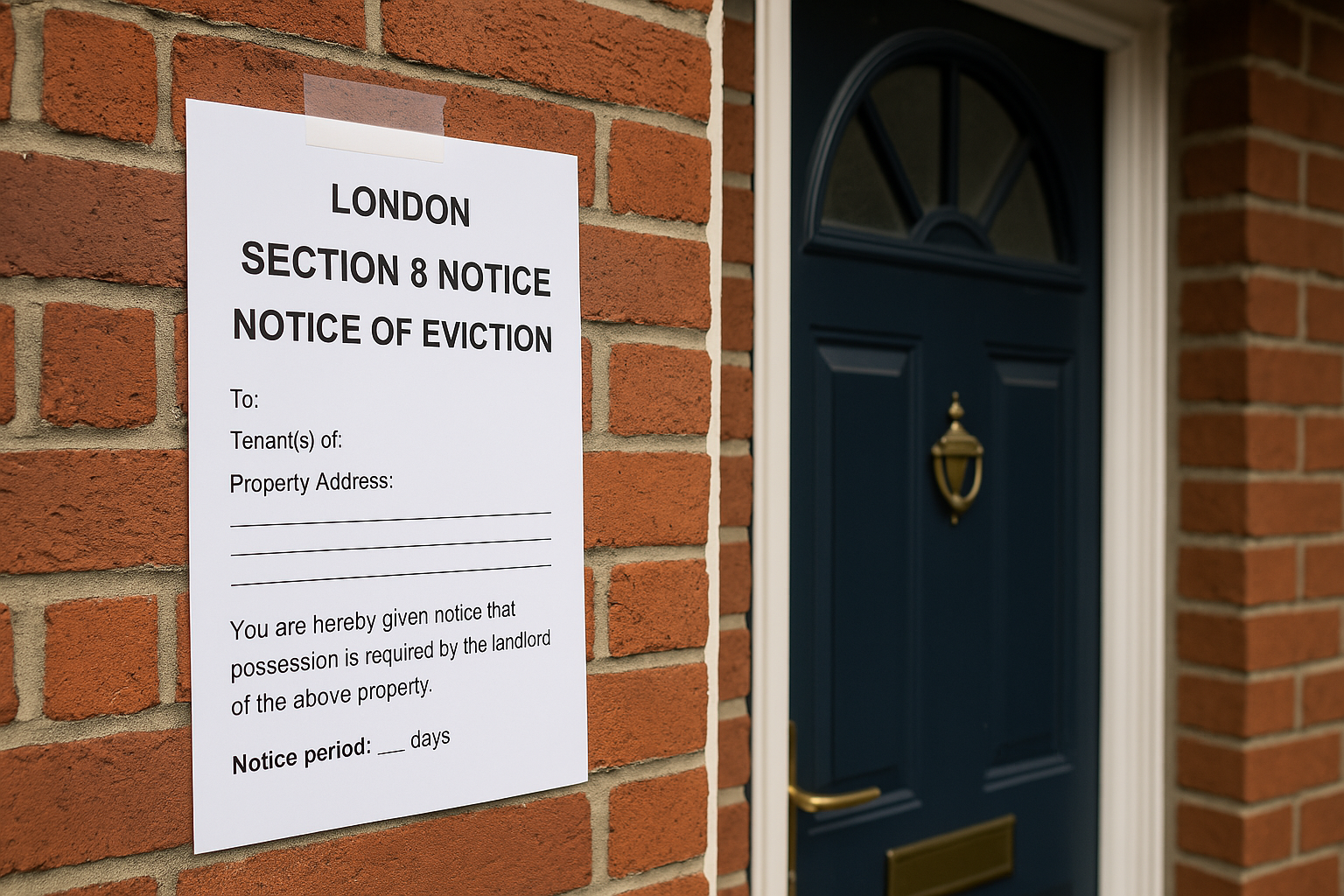The UK’s rental market is undergoing one of its most significant overhauls in recent history.
The Renters Reform Bill 2025 aims to reshape the balance between tenants and landlords, ensuring fairer practices, improved standards, and increased security for renters—while maintaining flexibility and stability for responsible landlords.
Abolition of Section 21: Ending ‘No-Fault’ Evictions
The abolition of Section 21 evictions marks a critical shift in tenant protections.
Landlords can no longer evict tenants without providing a legitimate reason, enhancing renters’ security in their homes.
Key Impacts:
Longer-term tenancies: Tenants can stay in their homes without fear of arbitrary eviction.
Increased accountability for landlords: Landlords must provide lawful grounds for eviction under strengthened Section 8 provisions.
Greater stability for families and vulnerable renters.
Grounds for Eviction under Revised Section 8:
Rent arrears over 2 months
Minimum notice period: 2 weeks
Court involvement: Required
Property sale by landlord
Minimum notice period: 2 months
Court involvement: Required
Anti-social behaviour
Minimum notice period: Immediate to 4 weeks (depending on severity)
Court involvement: Required
Breach of the tenancy agreement
Minimum notice period: 2 weeks
Court involvement: Required
Introduction of a Single System of Periodic Tenancies
The Bill standardises all tenancies to periodic agreements, replacing Assured Shorthold Tenancies (ASTs). This enhances flexibility while protecting tenant rights.
Benefits:
Easy transition for tenants wishing to move without long-term fixed contracts.
Notice period requirement: Tenants must provide two months’ notice before leaving.
Reduces unlawful evictions through more precise rules.
Creation of the Private Renters’ Ombudsman
A new independent ombudsperson will resolve disputes between private landlords and tenants swiftly and cheaply.
Advantages:
Free access for tenants to challenge unfair practices.
Faster dispute resolution than the courts.
Mandatory membership for all private landlords.
Landlord Portal and Property Registration
The government will introduce a nationwide landlord property portal.
Core Functions:
Centralised registration for all privately rented properties.
Proof of compliance with safety standards (EPC, gas safety, etc.).
Transparency for tenants to check landlord credentials and history.
Ban on Blanket Bans: Pets and Discrimination
The Bill promotes inclusivity and fairness by removing unfair barriers to renting.
Pets in Rental Properties:
Tenants will have the legal right to request a pet.
Landlords must not unreasonably refuse.
Pet insurance may be required to cover potential damage.
Anti-Discrimination Measures:
Landlords cannot impose blanket bans on tenants with children or those on benefits.
Reinforces equal opportunity access to housing.
Improvements to Housing Quality Standards
A new Decent Homes Standard will apply to the private rental sector for the first time, aligning it with social housing regulations.
Core Requirements:
Properties must be safe, warm, and in a reasonable state of repair.
Landlords will be held to legal maintenance standards.
Local authorities are empowered to enforce repairs with penalties for non-compliance.
Strengthening Tenant Rights and Awareness
The Bill mandates better communication and documentation from landlords, ensuring tenants understand their rights and responsibilities.
New Requirements:
Written tenancy terms must be provided.
Clear rent increase procedures—once annually with two months’ notice.
Prohibition of exploitative fees and practices.
Supporting Responsible Landlords
While tenant protections are at the forefront, the Renters Reform Bill addresses landlord concerns.
Support Measures:
Easier recovery of properties in genuine cases (e.g. moving in, selling).
Protection against anti-social tenants through fast-tracked court processes.
Access to dispute resolution through the ombudsman reduces legal costs.
Local Authority Empowerment and Enforcement
Councils will gain increased powers to enforce standards and penalise rogue landlords.
Tools and Penalties:
Fines up to £30,000 for non-compliance.
Banning orders for repeat offenders.
Public ‘rogue landlord’ databases.
Transition Timeline and Implementation Strategy
The Bill is set to be implemented in phases, ensuring a smooth transition for all stakeholders.
Renters Reform Bill 2025 Rollout Timeline:
November 2024: Draft legislation submitted.
January–February 2025: Parliamentary debate and amendments.
March-May 2025: Setup of the Private Renters’ Ombudsman and Landlord Portal.
June 2025: Section 21 ‘no-fault evictions’ officially abolished.
July–August 2025: All tenancies transition to periodic agreements.
September–October 2025: Full implementation of the Bill’s provisions.
Conclusion
The Renters Reform Bill 2025 is a landmark legislative overhaul that promises to deliver fairer, safer, and more stable housing for millions of tenants while respecting the rights of responsible landlords.
It introduces long-overdue reforms modernising the private rental market, offering transparency, efficiency, and justice for all parties involved.
By understanding these changes and preparing early, tenants and landlords can navigate the transition smoothly and confidently.
Frequently Asked Questions (FAQ)
About the Renters Reform Bill 2025
What is the Renters Reform Bill 2025?
A: It is a significant overhaul of the rental housing system in England aimed at improving tenant protections, raising housing standards, and making renting fairer for landlords and tenants.
What happens to Section 21 ‘no-fault’ evictions?
A: Section 21 will be abolished. Landlords can no longer evict tenants without giving a valid, legal reason. All evictions must go through the court with evidence under Section 8 grounds.
Will all tenancies become periodic?
A: Yes. The Bill replaces Assured Shorthold Tenancies (ASTs) with a single system of open-ended, periodic tenancies, allowing tenants to leave with two months’ notice and landlords to regain possession only with a legal reason.
How will disputes between tenants and landlords be resolved?
A: A new Private Renters’ Ombudsman will be introduced. It will handle complaints quickly, reasonably, and free of charge to tenants, offering an alternative to lengthy court processes.
Can landlords still sell or move back into their property?
A: Yes. Landlords can regain possession if they plan to sell the property or move in themselves. However, they must provide proper notice and evidence.
What about pets? Can tenants now keep them?
A: Tenants can request a pet, and landlords must not unreasonably refuse. Landlords may ask tenants to obtain pet insurance to cover potential damages.
Are there changes to rent increases?
A: Yes. Landlords can only increase rent once per year and must give tenants at least two months’ notice. Rent increases must be fair and challenging.
What is the new landlord portal?
A: It’s a national database where landlords must register their properties and upload compliance documents. Tenants can view landlord credentials before renting.
How will the new standards affect housing quality?
A: The Decent Homes Standard will now apply to private rented homes, requiring landlords to maintain safe, warm, and well-repaired properties or face enforcement action.
When will the changes take effect?
A: The Bill is being implemented in stages throughout 2025. Section 21 is expected to be abolished by June 2025, with full implementation by autumn 2025.
Read our other Blogs:
The 15 Most Expensive Neighbourhoods Outside London in 2025
2025 Making Tax Digital (MTD) for Sole Traders and Landlords





